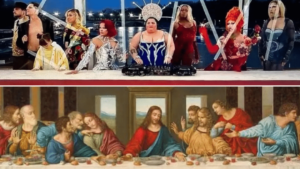
In four days, my children saw two radically different artistic depictions of Jesus. The first was in the Olympics’ opening ceremony. In the now infamous scene, Leonardo Da Vinci’s The Last Supper was depicted with a feminine Jesus with gender confused disciples while the pagan god Bacchus shows up and they watch a highly sexualised fashion show of other gender confused people.
Outrage was stirred up from around the world. It seems the highly secular French didn’t realise that Christianity is not merely a Western religion in decline. Christians around the world were outraged at this blasphemy, this reimagining of Jesus into someone who celebrates sin, lies, and ugliness instead of the true, the good, and the beautiful.
My children were not aware that this was a depiction of a famous painting of a highly significant moment in Jesus’ life. They were more confused by the ugly, sexual display; a horrible decision for a program which would be viewed by children of all ages from around the world. Not many parents want their children exposed to such inappropriate and adult content.
My reaction to this blasphemous depiction of Jesus was two-fold. At one level, it is frustrating that an event designed to bring the world together has decided to mock the Jesus I love and all his followers. And this mocking is at very little risk to themselves. The threats of violence and riots were always zero. This wouldn’t be another Charlie Hebdo moment.
At another level, it’s boring; completely uninteresting. Jesus and Christians have been the butt of the joke for a very long time, and all the jokes have been done. Jesus has been transformed into someone who agrees with all the progressive political and cultural ideologies by those who haven’t spent the time to explore the most influential man who has ever lived.
There was another artistic display of Jesus in Bendigo recently which my children saw. A dramatisation of the life of Jesus as told by John. Performed by amateur (yet very good) actors from the Christian Union, a student club at La Trobe, they saw the Jesus of the Bible. The true Jesus. The Jesus who showed compassion to sinners, yet told them to stop sinning. The Jesus who loved those who knew their need for him, and who warned of God’s judgment for those who were self-satisfied.
While the Olympics wanted to drag Jesus down, humiliate him by turning him into someone he isn’t, as others have said, he has already undergone the greatest humiliation. As the Christian Union showed, Jesus died horribly on the cross for those who love darkness, so we could be forgiven and begin to walk in the light. But, thankfully, while people want to continue mocking, his humiliation is over. He was raised, and is now on the throne in heaven, biding his time before returning to save his people and bring justice.
The true, historical Jesus depicted by the Christian Union is so much more interesting, satisfying, and wonderful than the false version proclaimed by the Olympics. My prayer is that many would take the opportunity to explore him, before it is too late.